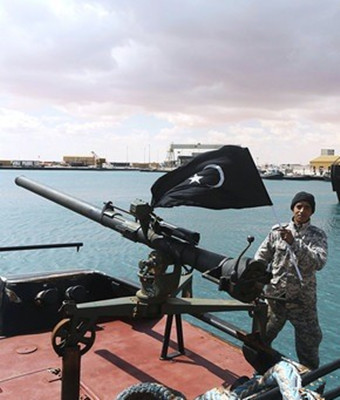利比亚政府
Sailing into troubled waters
驶向穷途
A struggle to control oil exports reflects deeper dysfunction
政府职能紊乱,无力控制原油出口
“OIL IS our strength”, declares a billboard campaign launched by Libya's oil ministry. The advertising is meant to foster national pride in a country still riven with regional and tribal faultlines three years after the ousting of its dictator, Muammar Qaddafi. But in Libya's restless eastern half, sometimes known as Cyrenaica, armed federalists are trying to make that slogan a political reality.
“石油是我们的力量。”利比亚石油部门在宣传活动中提出这句标语。在驱逐了独裁者卡扎菲·格达菲三年后,国家仍然四分五裂,部落存在断层。在这样的环境下,这句口号本是为了重聚国家的自豪感,然而在利比亚躁动的东半部,也就是所谓的昔兰尼加,武装组织却正将这一口号变为政治现实。
Since July a group calling itself the Cyrenaica Political Bureau has blockaded Libya's main oil ports, the country's chief source of income. Its initial pretext was to protest against alleged fraud in oil-export accounts, but its ambitions have widened. On March 11th it pulled off a coup, successfully loading and dispatching 234,000 barrels of crude oil—worth about $30m—aboard a North Korean-flagged tanker, in defiance of the central government.
从7月开始,自称为昔兰尼加政府的组织就封锁了利比亚石油出口的主要港口,而这是国家收入的主要来源。最初封锁的理由只是反对石油进口诈欺案,但它的野心越变越大。3月11日,组织发动政变,无视中央政府,强行卸下234000桶原油(约3000万美元)调运到朝鲜油轮上。

Authorities in the capital, Tripoli, responded furiously. On March 9th Ali Zeidan, the prime minister, called it an act of piracy and warned that the tanker would be bombed if it tried to leave the port of Es-Sider. Navy craft were mobilised to prevent the ship from departing. When it escaped nonetheless, apparently after a brief skirmish, Libya's acting proto-parliament, the 200-member General National Congress (GNC), voted to dismiss Mr Zeidan. Powerful local militias loyal to the GNC began an advance from Sirte, midway along the Libyan coast, towards the east. The rebels have been given two weeks to give up the oil terminals.
位于首都黎波里的当局对此反映强烈。3月9日,首相阿里·扎伊丹称这是盗窃行为,并且警告油轮如果试图离开意赛德港口,将会遭到炮击,并派遣海军舰队组织油轮的离开。然而在经过了一场小冲突后,它仍然逃脱了,利比亚国民议会因此投票罢免了扎伊丹。议会所属的武装力量立即从苏尔特沿着利比亚海岸出发一路向东,要求反叛军在两周之内放弃石油港口。
The drama has set the scene for what some analysts fear could be a descent into deeper disorder. The eastern rebels are no match for the better-armed government-aligned forces, and ordinary Cyrenaicans have little appetite for another all-out war, particularly given bitter local rivalries. But there is still a danger that the authorities in Tripoli may overplay their hand to the point of provoking full-scale rebellion in the east.
戏剧化的事态发展使分析师原本认为的袭击恶化为深层混乱。东部反叛军无法对抗装备良好的政府武装力量,而昔兰尼加平民也不希望另一场全面战争爆发,尤其反对激烈冲突。然而黎波里当局仍有可能过度插手,从而引发东部大规模的叛乱。
In moving to oust Mr Zeidan, the GNC asserted itself as Libya's prime authority. But it is divided along factional lines and has few tools to impose its writ. Blaming the ex-premier for the tanker fiasco, it also directed the state prosecutor to charge him with embezzlement. Mr Zeidan still managed to flee to Germany.
在驱逐扎伊丹的行动中,GNC声称它们自己是利比亚主要的当局。但是它沿着派系线来划分并且用一些工具来加强自己的法令。对前任首相油轮事件惨败的指责,也带来了国家检察官对他贪污的指控。扎伊丹仍试图逃亡德国。
In fact, many Libyans view the GNC as dimly as they had come to regard Mr Zeidan. Behind its manoeuvrings many see the hand of powerful Islamist groups, led by the Justice and Construction Party, which is affiliated to the Muslim Brotherhood. Frequently during Mr Zeidan's year-and-a-bit in office, these groups moved to stymie his government's initiatives. The newly installed interim prime minister, Abdullah al-Thinni, a former defence minister, is thought to be close to the Islamists, as is the speaker of the GNC, Nuri Abu Sahmain. Both men are supported by the country's best-armed militias, based in the city of Misrata, whereas Mr Zeidan was backed by armed groups from Zintan, to the southwest of Tripoli.
事实上,许多利比亚人隐约地看待GNC如果看待扎伊丹一样。它的阴谋活动背后有许多能看到由公正和建设党领导的伊斯兰主义组织,隶属于穆斯林兄弟会。扎伊丹任职期间这些组织频繁的妨碍他政府的主动权。新上任的临时首相,前国防部部长Abdullah al-Thinni也被认为是伊斯兰主义者,就像GNC的发言人Nuri Abu Sahmain一样。他们都是由总部在米苏拉塔的国家最好的民兵支持,然而扎伊丹是由来自黎波里西南部城市津坦的武装组织支持。
These rival forces have clashed around Tripoli for several months. In the wake of Mr Zeidan's ejection the city's military council, which co-ordinates Tripoli's various local militias, issued an order for the withdrawal of “forces occupying strategic positions”. This was seen as a warning to the Zintan group, which controls the capital's main airport among other places.
这些敌对势力在黎波里发生冲突好几个月了。随着扎伊丹被负责协调黎波里大量当地的民兵的军事委员会驱逐,他们提出撤回“武装占领战略位置”的要求。这被看作是做对津坦组织的一个警告,该组织控制着首都与其他地方之间的主要机场。
The main city in the east, Benghazi, has meanwhile become increasingly insecure. Near-daily bombings and assassinations appear to be aimed at undermining any authority, to the advantage of jihadist factions that seek to impose Islamic law. With oil exports slumping from 1.4m barrels a day to around 235,000, the central government has plundered the country's foreign reserves to keep salaries flowing. It is not clear how long it can afford to continue.
东城区主部班加西,同时日益危险。几乎每天出现炮轰和暗杀,旨在破坏任何当局,利用圣战主义派系来加强伊斯兰法律。随着石油进口量从每天14,000,00桶下降到大约235,000桶,中央政府还是掠夺国家的外汇储备来维持资金的流动。目前尚不清楚它能持续多久。
These ingredients make a combustible mixture. Fighting in the east could provoke a wider insurrection there; and deepening disorder in Tripoli could tempt other local authorities, especially those in the deep south, to declare their autonomy. Should a Brotherhood-friendly government emerge in Tripoli, neighbouring countries such as Egypt and Algeria would become twitchy.
这些因素都是这些混合情况一促即发。东部的争斗可能会引发更深的动乱,黎波里严重加深的动乱会引起其他当局,特别是南方的,来宣布他们的自主权。是否一个兄弟友好型的政府在黎波里出现,会引起周边如埃及和阿尔及利亚国家的焦躁不安呢。
Libya may yet drag itself back from the brink. Rather than attempting to hold their ground at Sirte, the Cyrenaican rebels quietly pulled back to the old border line that demarcates the former federal region, which was abolished in 1963. Optimists point out that Mr Zeidan was ousted by an elected body, and left without a shot fired. GNC members have promised fresh national elections by midsummer. But just now that looks awfully distant.
利比亚可能仍未将自己从边缘处来回。与其试图守住在苏尔特的立场,昔兰尼加反叛军悄悄回到老的前联邦区域的边境线,这边境线在1963时曾被废除。乐观主义者指出扎伊丹是由民选机构驱逐的,并未留下战火。GNC成员已经承诺在盛夏时举行新的选举。但这似乎看起来遥不可及。













